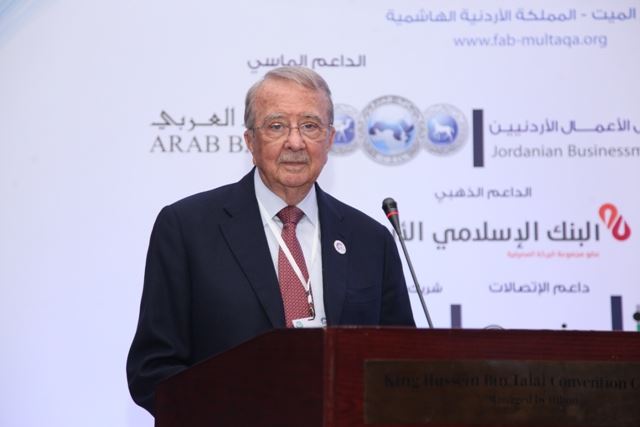Participants in the 16th Arab Business Community Forum recommended the establishment of an Arab salvation fund to finance an Arab reconstruction project for countries that witnessed destruction in various sectors, in which Arab sovereign funds and Arab business leaders have a key role in the proposed bid.
The business community also stressed the importance of rebuilding Arab economies affected by political turmoil during the recent period, implementing economic and political reforms on sound democratic foundations, simultaneous with preserving constitutional institutions, and providing security and stability.
Participants in the forum, organized by the Arab Businessmen Union at the King Hussein Bin Talal Palace, expressed their appreciation to His Majesty King Abdullah II for patronizing the event, who decided to hold the 17th forum in Lebanon next year.
The final statement read by the President of the Union of Arab Businessmen Hamdi Tabba’a urged investment in renewable energy as a clean alternative in the present and future, and integration of advanced technology in its production and distribution.
To achieve this ambition, Arab governments should encourage the generation, use and export of this energy by providing necessary infrastructure and exemptions, and enacting relevant legislation, the statement added.
On economic stimulus, the statement spurred Arab countries to coordinate and standardize investment legislation, enhance investment incentives, improve the business environment, good governance of institutions, boost relevant judicial bodies, shorten litigation, fight corruption and bureaucracy in public and investor administrations, and streamline procedures in a bid to lure investments.
“Entrepreneurship has become a contemporary economic culture around the world based on creativity, innovation, invention and initiative. Arab governments should encourage these initiatives that expand the labor market through the development of industry and manufacturing sectors,” the statement said.
As for the food sector, it pointed to the need to adopt food security projects and attract investments as a strategic priority, as well as ensuring availability of strategic stocks of commodities.
It called for the development of the Arab rural areas through the provision of basic services to stop rural-urban migration, the provision of loans to farmers, the promotion of the agricultural cooperative sector, as well as small and medium-sized enterprises.
On inter-Arab accords, it called on Arab governments to activate the Greater Arab Free Trade Area, remove all obstacles to inter-Arab trade and unify the Arab customs procedures.
It stressed the need to implement the strategy of joint Arab economic cooperation, which emerged from Arab summits in renewable energy, water, agriculture, transportation, food, partnership with civil society, and combating poverty, unemployment.
As for foreign ties, the statement pointed to the importance of developing and improving Arab relations with the global economic blocs on a fair and balanced basis in trade, investment and employment.
The statement stressed the adoption of the green economy strategy as a model for sustainable economic development and a means of achieving economic justice and social welfare.
It said promotion and support of private sector investments is the most effective way to alleviate unemployment and poverty.
The statement pointed out that education and scientific research are the foundation of progress and development, simultaneous with reviewing educational curricula to be commensurate with the requirements of sustainable development.
As for Jerusalem, it affirmed that Al-Quds Al-Sharif is the capital of the state of Palestine, stressing the support of the Palestinian people on their steadfastness in defiance of Israeli aggression.
The statement called on the Arab leaders at their next summit in Saudi Arabia to prioritize the Arab economic issues on their agenda to achieve Arab integration that will be the cornerstone of security and stability of the Arab nation.
